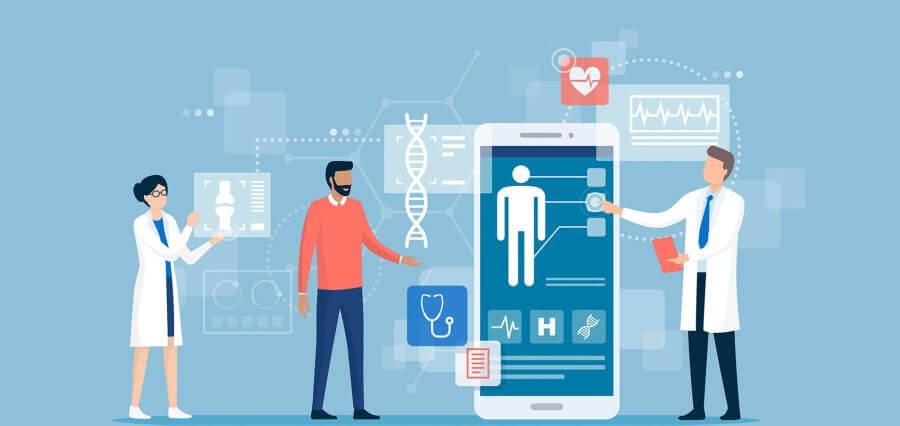Success Strategies
Medical industry is experiencing a significant transformation driven by digital advancements. The integration of technology has revolutionized various aspects of healthcare, including patient care, diagnostics, treatment, and administrative processes. These digital advancements have the potential to improve efficiency, enhance patient outcomes, and empower healthcare providers.
In this article, we will explore the key digital advancements that are transforming the healthcare industry and discuss success strategies for organizations to navigate this digital revolution.
Telemedicine: Expanding Access to Care
One of the most significant digital advancements in healthcare is the rise of telemedicine. Telemedicine involves the use of communications technology to provide remote healthcare services. It enables patients to connect with healthcare providers virtually, eliminating the barriers of distance and enhancing access to care, particularly for individuals in rural or underserved areas. Healthcare organizations can embrace telemedicine by implementing secure video conferencing platforms, ensuring regulatory compliance and integrating telemedicine services into their existing workflows. Success in telemedicine implementation requires a strong technological infrastructure, clear communication with patients, and training for healthcare providers to deliver effective virtual care.
Artificial Intelligence (AI): Enhancing Diagnosis and Treatment
AI has emerged as a strong tool in healthcare, transforming the way diagnoses are made and treatments are delivered. Machine learning algorithms analyzes large amounts of medical data to identify patterns, detect diseases, and provide personalized treatment recommendations. Success in leveraging AI requires healthcare organizations to invest in robust data management systems, ensure data privacy and security, and collaborate with AI experts to develop accurate and reliable algorithms. By integrating AI into clinical workflows, healthcare providers can enhance diagnostic accuracy, improve treatment outcomes, and optimize resource utilization.
Internet of Things (IoT): Connected Healthcare Ecosystems
The Internet of Things (IoT) has enabled the development of connected healthcare ecosystems, where medical devices, wearables, and other healthcare technologies are interconnected and seamlessly share data. Success in leveraging IoT requires healthcare organizations to implement interoperable systems, ensure data integrity and security, and establish clear protocols for data collection and analysis. By harnessing the power of IoT, healthcare providers can gain valuable insights into patient health, enable remote monitoring, and deliver proactive and personalized care.
Electronic Health Records (EHRs): Streamlining Information Management
The adoption of electronic health records has transformed information management in healthcare. EHRs digitize patient medical records, making them easily accessible to healthcare providers across different care settings. Success in implementing EHRs requires healthcare organizations to invest in user-friendly EHR systems, ensure interoperability with other healthcare systems, and provide comprehensive training for healthcare providers. By leveraging EHRs, healthcare organizations can streamline workflows, reduce medical errors, improve care coordination, and enhance patient safety.
Data Analytics: Driving Evidence-Based Decision Making
Data analytics plays a key role in healthcare industry by enabling evidence-based decision-making. Advanced analytics tools can analyze vast amounts of healthcare data to identify trends, patterns, and correlations that inform clinical decision-making, resource allocation, and quality improvement initiatives. Success in data analytics requires healthcare organizations to establish robust data governance frameworks, invest in analytics infrastructure, and ensure compliance with privacy and security regulations. By harnessing the power of data analytics, healthcare organizations can improve patient outcomes, optimize resource utilization, and drive continuous quality improvement.
Cybersecurity: Safeguarding Patient Data
As digital advancements continue to transform the healthcare industry, cybersecurity has become a critical concern. The increased reliance on digital systems and the sharing of sensitive patient data make healthcare organizations vulnerable to cyber threats. Success in cybersecurity requires healthcare organizations to implement robust security protocols, educate staff on cybersecurity best practices, and continuously monitor and update security measures. By prioritizing cybersecurity, healthcare organizations can protect patient data, maintain trust, and prevent potential breaches that may adversely affect patient care and organizational reputation.
Collaboration and Partnerships: Navigating the Digital Transformation
Navigating the digital transformation in healthcare requires collaboration and partnerships among healthcare organizations, technology companies, and regulatory bodies. Success in the digital era necessitates embracing a culture of innovation, fostering interdisciplinary collaborations, and staying informed about emerging technologies and industry trends. Healthcare organizations should actively seek partnerships with technology companies to leverage their expertise and drive innovation in the field. Collaboration with regulatory bodies is crucial to ensure compliance with evolving digital health regulations and to establish standards for data privacy and security.
Conclusion
Digital advancements are revolutionizing the healthcare industry, offering unprecedented opportunities to improve patient care, enhance outcomes, and streamline processes. Success in leveraging these technologies requires healthcare organizations to invest in robust technological infrastructure, establish clear protocols and standards, and foster a culture of innovation and collaboration. By embracing the digital transformation, healthcare organizations can navigate the changing landscape, deliver patient-centered care, and drive positive change in the industry. The future of healthcare is digital, and organizations that embrace these advancements will thrive in delivering efficient, effective and patient-centric care.
-Pooja Shah









